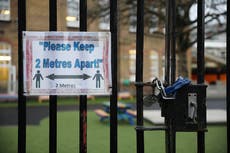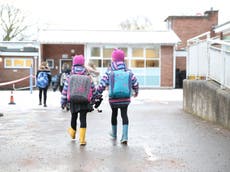Children being put under ‘huge’ pressure due to ‘catch up narrative’, say experts
‘We shouldn’t simply expect children and young people to pick up where they’ve left off,’ educational psychologist says

Your support helps us to tell the story
From reproductive rights to climate change to Big Tech, The Independent is on the ground when the story is developing. Whether it's investigating the financials of Elon Musk's pro-Trump PAC or producing our latest documentary, 'The A Word', which shines a light on the American women fighting for reproductive rights, we know how important it is to parse out the facts from the messaging.
At such a critical moment in US history, we need reporters on the ground. Your donation allows us to keep sending journalists to speak to both sides of the story.
The Independent is trusted by Americans across the entire political spectrum. And unlike many other quality news outlets, we choose not to lock Americans out of our reporting and analysis with paywalls. We believe quality journalism should be available to everyone, paid for by those who can afford it.
Your support makes all the difference.Children are being put under “huge” pressure by an ongoing narrative around education that emphasises the need to “catch up” on the learning lost during the pandemic, experts have warned.
It comes amid speculation the government is considering summer schools, extended school days or shorter summer holidays to help children make up for lost education due to school closures.
Sir Kevan Collins, the government’s new education recovery tsar, said earlier this month teachers will be asked to increase learning time for children in light of disruption caused by the coronavirus pandemic.
But educational psychologists have warned the focus on education catch-up is putting pressure on children and urged the government to reconsider this focus.
Young people should be supported through socialisation and play if the government decides to extend the amount of time that they spend in school, the British Psychological Society (BPS) has urged.
Follow the latest news live as Boris Johnson to unveil lockdown exit
"The pandemic has disrupted all aspects of life and it’s unrealistic to expect children who have lived through this disruption to settle down into additional formal learning after the experiences they’ve had,” Dr Dan O’Hare, co-chair of the BPS’ division of educational and child psychology, said.
"Formal lessons must of course continue, but we shouldn’t simply expect children and young people to pick up where they’ve left off and ‘catch up’ immediately on any gaps in their learning.
"This places huge and unnecessary pressure on children who have been through an extraordinary and potentially stressful time."
Dr O’Hare said creating the time and space for children to express themselves through play is a "useful tool" to help them process what’s been happening.
"Whatever a child or young person’s circumstances, we can’t assume that the right thing to support their recovery and wellbeing is for them to be in lessons for longer each day," he added.
A group of experts in child development wrote to Gavin Williamson, the education secretary, this month to call for measures prioritising the emotional wellbeing of children when England’s lockdown eases.
PlayFirstUK – which includes 15 child psychologists and education specialists, said young people should be allowed to play with friends this summer for their mental health instead of doing extra lessons.
Speaking to the BBC earlier this month, Sir Kevan, the new education recovery commissioner, suggested it was important to think about other areas beyond just academic study where children have lost out on due to the pandemic.
"I think we need to think about the extra hours not only for learning, but for children to be together, to play, to engage in competitive sport, for music, for drama because these are critical areas which have been missed in their development," he said
Last year, the coronavirus pandemic kept most students at home from last March until the start of June, when some year groups were allowed back into the classroom in England.
While all students were allowed back from September until the end of the autumn term, children faced remote learning if told to self-isolate as a close contact of a coronavirus case.
Towards the end of the year, this amounted to hundreds of thousands of children in England each week who could not attend classrooms, according to Department for Education (DfE) data.
Schools moved online to all but vulnerable and key worker pupils in early January, however students are due to return on 8 March under an easing of restrictions announced by Boris Johnson on Monday.
Dr O’Hare from BPS said it was “absolutely understandable” that parents were concerned about their children missing out on “many aspects of their formal education” throughout the pandemic.
"However, the notion that children need to catch up or are ‘behind’ at school due to the pandemic reinforces the idea that children have ‘one shot’ at their education and puts them under even more pressure to perform academically after what has been a challenging and unprecedented time for everyone,” he said.
A Department for Education spokesperson said: "We know the pandemic has had an impact on many children and young people’s mental health and wellbeing, and that’s why we are working to fully reopen schools as soon as possible.
"Our guidance has emphasised the importance of pastoral support both in school and as part of remote provision and included advice and support on mental wellbeing.”
They added: "The £650m catch-up premium funding can be used for pastoral support activity where needed to support reengagement and recovery.
"To support children returning to schools, our £8m Wellbeing for Education Return programme funds local expert support for education staff to respond to emotional and mental health pressures some children and young people may be facing."
Additional reporting by Press Association





Join our commenting forum
Join thought-provoking conversations, follow other Independent readers and see their replies
Comments